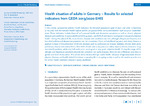Health situation of adults in Germany – Results for selected indicators from GEDA 2019/2020-EHIS
Heidemann, Christin
Scheidt-Nave, Christa
Beyer, Ann-Kristin
Baumert, Jens
Thamm, Roma
Maier, Birga
Neuhauser, Hannelore
Fuchs, Judith
Kuhnert, Ronny
Hapke, Ulfert
In this article, we examine selected health indicators for the adult population aged 18 years and older in Germany (n=22,708) from the German Health Update (GEDA 2019/2020-EHIS) conducted between April 2019 and September 2020. These indicators include those of self-assessed health and depressive symptoms as well as chronic physical diseases and conditions. In young adulthood (18 to 44 years), over 80% of participants report good or very good subjective health. During this phase of life, most chronic diseases and conditions are rare, although allergies are frequent, and bronchial asthma and depressive symptoms are not uncommon. From mid adulthood (45 years and older), there is a gradual increase in the prevalence of chronic diseases such as cardiovascular disease, diabetes, chronic obstructive pulmonary disease and osteoarthritis. Over 60% of older adults (65 years and older) report a chronic disease or long-term health problem, while only half continue to report good or very good subjective health. During this stage of life, allergies and depressive symptoms become less prevalent. For some diseases, there are also differences according to gender and level of education. This article demonstrates the high public health relevance of age-associated chronic physical diseases and health related limitations in everyday life in an ageing society as well as the need to provide care for certain health conditions already in young adulthood.
Files in this item

